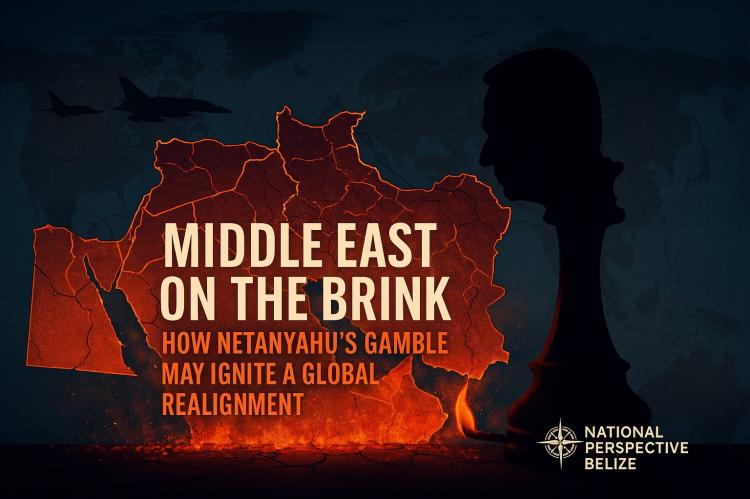"Middle East on the Brink: How Netanyahu’s Gamble May Ignite a Global Realignment"
By: Omar Silva Editor/Publisher & Editorial Team
National Perspective Belize I Digital 2025
Belize City: Friday 20th June 2025
🔥 SPECIAL FEATURE HEADLINE:
The Middle East, once again, teeters on the edge of catastrophe. But unlike previous eruptions, the ongoing escalation—set in motion by Israel under Prime Minister Benjamin Netanyahu—is not confined to Gaza, Lebanon, or Syria. It has become the nucleus of a broader geopolitical earthquake that now threatens to redraw alliances, embolden adversaries, and expose the limits of American power.
This is no longer just Israel versus Hamas. It is Israel versus a growing, state-backed axis—anchored by Iran and supported by regional proxies, international rivals, and a world increasingly sceptical of Western dominance.
Legal Overreach or Self-Défense? The Debate That Divides the World
From a legal standpoint, Israel’s right to self-defence is well-established under international law. However, military actions must be proportionate, discriminate, and respect humanitarian principles. The sustained aerial bombardments of Gaza and speculative incursions into Syrian and Iranian territory have drawn accusations of collective punishment and war crimes, including from United Nations officials and global human rights groups.
Further complicating matters, the targeted assassination campaigns and extraterritorial strikes blur the lines between defensive necessity and premeditated aggression. Netanyahu’s government has, arguably, crossed into the realm of pre-emptive militarism without a declared war, a move fraught with legal and diplomatic peril.
Military Miscalculation: Israel's Strategic Overreach
Militarily, Israel has long enjoyed dominance in the region—technological superiority, advanced missile defense, and unquestioned U.S. support. But this conflict reveals a dangerous shift in the strategic landscape:
- Iran’s direct involvement, coupled with proxy mobilization from Lebanon (Hezbollah), Yemen (Houthis), Iraq, and Syria, has created a multi-front conflict Israel cannot contain without escalation.
- Israel’s qualitative edge is being tested by the sheer volume and precision of missile attacks and drone swarms. Its famed Iron Dome and David's Sling systems are stretched thin, exposing vulnerabilities once thought unthinkable.
- Perhaps most critically, the prospect of a two- or three-theater war—including a direct engagement with Iran—would overwhelm Israel’s military capacity and draw the U.S. into a conflict it cannot politically or economically sustain.
The Trump Dilemma: Reluctance in a Divided Superpower
The U.S.—a traditional pillar of Israeli deterrence—is in a peculiar bind. With President Trump set to take office amid domestic chaos and anti-war sentiment surging across party lines, the administration’s hands are tied.
- Trump's nationalist base rejects entanglement in another costly war.
- Key Republican and Democratic lawmakers are split over Israel’s conduct, especially in light of growing public anger over Palestinian civilian casualties.
- Military planners are already stretched thin across Europe (Ukraine), the Indo-Pacific (Taiwan), and global hotspots—leaving little appetite or bandwidth for a full-scale confrontation in the Persian Gulf.
In essence, Netanyahu lit a fire expecting U.S. firepower to contain it, but Washington is now blinking in the face of unpredictable consequences.
Iran’s Moment: From Pariah to Power Broker
Iran, long treated as a rogue state, now finds itself elevated. It has successfully framed its intervention as resistance to Western imperialism. With the backing—tacit or direct—of Russia, China, and several BRICS nations, Tehran is leveraging this conflict to:
- Cement its leadership of the Global South,
- Challenge Western narratives on legitimacy and power,
- Expose the fragility of the U.S.-led international order.
The new multipolar moment is no longer theory—it is unfolding before our eyes, fueled by the failures of Western diplomacy and the recklessness of political brinkmanship.
Why Belize and the World Should Care
For nations like Belize, this conflict is not distant. Its repercussions will reverberate through:
- Global oil prices and inflation, straining small economies;
- Shifting trade alignments, with BRICS nations creating parallel systems to Western banking and commerce;
- Diplomatic realignments, where neutrality may no longer be an option.
Most importantly, the erosion of international legal norms and the impunity of nuclear-armed states places all smaller nations at risk. If global powers can disregard borders, commit pre-emptive strikes, and ignore humanitarian conventions, what recourse remains for small, peace-loving nations when confronted with aggression or exploitation?
Conclusion: This Is Not Just Israel’s War—It’s a Global Reckoning
Netanyahu may have sought to restore deterrence and bolster his fragile political standing. But instead, he has exposed the limits of Israeli power, the divided loyalties of the West, and the new confidence of global actors once dismissed as second-tier.
What unfolds next may decide not just the future of Israel or Palestine, but the very architecture of the international system.
The Middle East has always been a fault line. Now, it may become the crack that breaks the old-world order.
📰 National Perspective Belize will continue to monitor this rapidly evolving crisis with unwavering commitment to truth, sovereignty, and regional awareness.
- Log in to post comments

